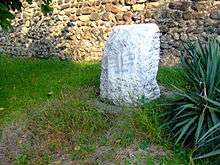Barbare Jorjadze
Barbare Jorjadze (1833-1895), also known as Barbare Eristavi-Jorjadze, was a Georgian princess, author, and women's rights advocate.
Princess Barbare Eristavi-Jorjadze | |
|---|---|
| Born | 1833 |
| Died | 1895 |
| Nationality | Georgian |
Notable work | Georgian Cuisine and Tried Housekeeping Notes, "A Few Words to the Attention of Young Men" |
| Spouse(s) | Zakaria Jorjadze |
| Parent(s) |
|
Background
Jorjadze was born in Georgia in 1833[1] and the daughter of Prince Davit Eristavi. She was married to Zakaria Jorjadze when she was 12. Her brother was the poet and historian Rapiel Eristavi.[2][3]
Writing

Considered Georgia's first feminist, Jorjadze was a poet, playwright and essayist.[2] She began writing in 1858, publishing poetry in Tsiskari magazine.[4] Despite public criticism, she continued publishing, including in newspapers and magazines such as Droeba, Iveria, Kvali, and Jejili.[1][4]
In 1861 she was vocal in debates around the modernization of the Georgian language, specifically challenging the ideas of Ilia Chavchavadze.[1]
Jorjadze's play, What I was looking for and what I found, was first staged in 1867 at the Kutaisi Theatre. It was performed for several years and various other theatres.[1]
In 1874 she published the cookbook, Georgian Cuisine and Tried Housekeeping Notes. Published by Ekvtime Kheladze's printing house, it collected recipes for both Georgian and European dishes.[1] Many of her recipes are considered to be standard practice for preparation of traditional Georgian dishes and the book continues to be popular, including with chefs such as Tekuna Gachechiladze.[2]
Jorjadze penned the letter "A Few of Words to the Attention of Young Men" which was published in 1893 in Kvali magazine.[4][2] Addressing women's rights, it is considered to be a manifesto of Georgian feminism.[1]
In 2017 the National Parliamentary Library of Georgia named a reading room after Jorjadze. The room also contains murals by Anuk Beluga, depicting Jorjadze and other Georgian female writers and activists.[2][5]
See also
References
- "Barbare Eristavi-Jorjadze". Feminism and Gender Democracy. Retrieved 22 November 2017.
- Giorgi, Lomsadze. "19th Century Princess And Cookbook Author Was Also Georgia's First Feminist". NPR. Retrieved 22 November 2017.
- Barkaia, Maia; Waterston, Alisse (2017). Gender in Georgia: Feminist Perspectives on Culture, Nation, and History in the South Caucasus. Berghahn Books. p. 24. ISBN 9781785336768.
- "Barbare Eristavi-Jorjadze". Gender Mediator. Retrieved 22 November 2017.
- "Barbare Jorjadze's Room Opens in National Library of the Parliament of Georgia". UNDP in Georgia. Retrieved 22 November 2017.